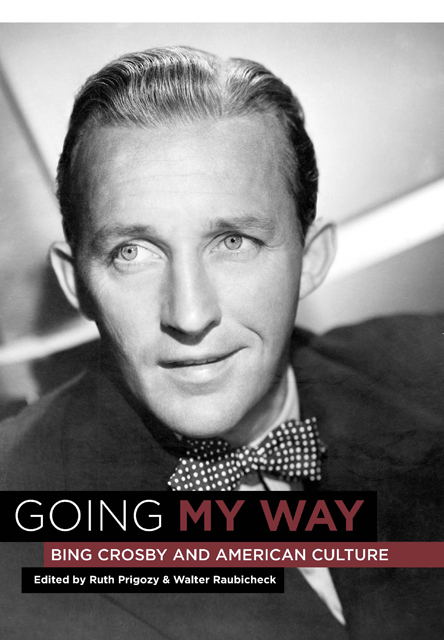Book contents
- Frontmatter
- Dedication
- Contents
- List of Illustrations
- Foreword
- Preface
- Acknowledgments
- Introduction Bing Crosby—Nothing Is What It Seems
- Part 1 Theoretical Perspectives on Crosby
- Part 2 Cultural Perspectives on Crosby
- Part 3 Historical Perspectives on Crosby
- Personal Comments
- Selected Bibliography
- List of Contributors
- Index
2 - Going My Way?: Crosby and Catholicism on the Road to America
Published online by Cambridge University Press: 11 March 2023
- Frontmatter
- Dedication
- Contents
- List of Illustrations
- Foreword
- Preface
- Acknowledgments
- Introduction Bing Crosby—Nothing Is What It Seems
- Part 1 Theoretical Perspectives on Crosby
- Part 2 Cultural Perspectives on Crosby
- Part 3 Historical Perspectives on Crosby
- Personal Comments
- Selected Bibliography
- List of Contributors
- Index
Summary
Introduction
In his history of Irving Berlin's song “White Christmas,” Jody Rosen reflects on the ironic fact that one of the most popular Christmas songs of the twentieth century had been written by a Russian Jewish immigrant.
The pop-song industry was dominated in both its creative and commercial spheres by Jews—many of them, like Berlin, recent immigrants—and the music it gave the world was the music of assimilation, a New World concoction: the result of a people's striving for social acceptance and a piece of the American pie.
In his own analysis of the early motion picture industry, Neal Gabler comes to much the same conclusion. As Rosen puts it, “much of twentieth-century pop culture is a kind of Yankee Doodle Yiddishkeit.” Members of this religious community, which was increasingly dominated by impoverished immigrants who were confronting the conflict between the American dream of success and the American reality of marginalization, sought out venues available to them—such as the emerging fields of recorded music and motion pictures—to recast themselves into a form more familiar, and thus more acceptable, to the American dominant culture. In so doing, argue both Gabler and Rosen, they “remade American pop culture in their own image” and recreated what it meant to be an “American.”
The history of religion in twentieth-century America reveals other groups, besides the Jewish community, whose members struggled with the forces of marginalization in an attempt to enter the cultural mainstream only to profoundly affect that culture in the process. However, one group that receives significantly less attention in the literature is the American Catholic community, which in its own way struggled “for social acceptance and a piece of the American pie.” In the twentieth century, American Catholics, like their Jewish neighbors, sought admission into the American way of life and many of them did it in exactly the same (or parallel) venues, whether they were Catholic singers, actors, or—in their own way—critics of both of those industries.
- Type
- Chapter
- Information
- Going My WayBing Crosby and American Culture, pp. 17 - 34Publisher: Boydell & BrewerPrint publication year: 2007



